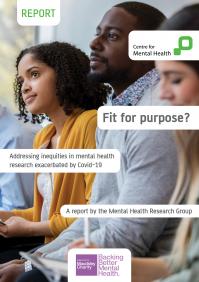Addressing inequities in mental health research exacerbated by Covid-19
A report by the Mental Health Research Group
The Covid-19 pandemic has exacerbated inequalities in mental health in the UK. Those with pre-existing mental illness, young people, women and some racialised communities are among the most likely to experience worse mental health impacts as a result. Despite this, longstanding limitations in mental health research mean that we do not have the necessary evidence to inform responses to the population’s increasing and starkly unequal mental health needs. If we do not address these weaknesses, we could see worsened inequality in mental health outcomes in the UK.
Fit for purpose? Addressing inequities in mental health research exacerbated by Covid-19 was produced on behalf of the Mental Health Research Group, an independent group of leaders in mental health in England. It highlights the inequities in mental health research funding and production, what gets investigated and who gets to contribute, as well as who and what is left out of the conversation. It shares examples of work taking place to address mental health inequalities and to challenge inequities of power and influence within mental health research.
The report calls for systemic change in the ways mental health research is planned, funded and delivered in the wake of the Covid-19 pandemic. It calls on all those who carry out, fund or manage research to:
- Ensure wider representation of groups and communities that have been silenced or overlooked, especially racialised communities.
- Invest in widening the range of people and organisations that can get research funding, including community and user-led organisations.
- Ensure resources are targeted towards key areas that will help to build the evidence base for tackling mental health inequalities, including children and young people, prevention, and factors that influence mental health.
- Find ways to bring together and value different types of knowledge in the production of evidence to inform policy and practice.






